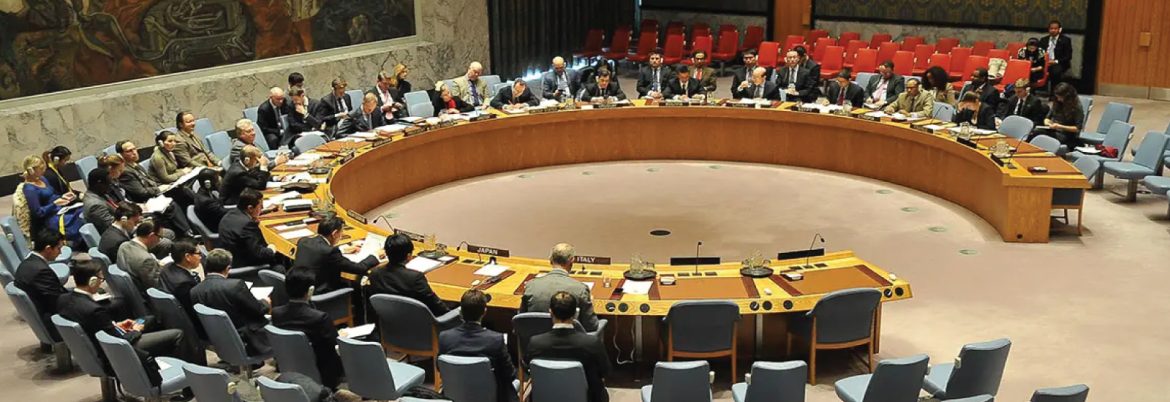244
Key Highlights from UNSC Resolution 1540 Statement
Pakistan’s representative emphasized that non-proliferation is a “shared global objective” that must be pursued within the framework of the UN Charter. Islamabad called for a “non‑discriminatory, objective and criteria-based approach” to prevent WMD proliferation to non‑state actors. Pakistan rejected selective or politically‑driven enforcement ofnon‑proliferation rules. Pakistan’s statement on UNSC-1540 warned against advancing “political objectives masked as non‑proliferation concerns” on a selective basis, and urged that efforts should instead focus on collective global and regional strategic stability. This reflects Pakistan’s strategic interest in ensuring that non‑proliferation measures do not become tools of discrimination or exclusion, and that its own security andtechnological developmentare not unfairly constrained.
Pakistan underlined that it has fully implemented its obligations underUNSC Resolution 1540. The delegation reported a“robust command and control system, a rigorous mechanism to regulate the transfer of sensitive goods and technologies, and an export control regime at par with the highest international standards”. Moreover, Pakistan has enacted laws and regulations to control nuclear, biological, and chemical and dual‑use items, and set up enforcement and licensing bodies accordingly. Islamabad has“submitted six reports, including the comprehensive matrix,”to the 1540 Committee and has offeredtechnical assistance to other countries, underscoring its proactive posture in non‑proliferation implementation. These reports, required under Resolution 1540, detail national legislation and control lists. Pakistan also highlighted support for regional cooperation, for example, sharing best practices and training with neighboring states to help implement the resolution effectively. Pakistan’s efforts and robust policy-making portray Pakistan as a responsible nuclear state that has established high‑level export controls and contributed to the capacity-building of other states.
Consistent with its stance on 1540, Pakistan emphasized that global disarmament and non-proliferation efforts must be non-discriminatory and inclusive. The delegation welcomed multilateral disarmament forums, and stated that they should be based on“objective, and criteria-based”rules rather thanpolitical favoritism. In particular, Pakistan proposed establishing “an all‑inclusive open‑ended working group under the UN”. This forum would address the legitimate right of all states to peaceful nuclear and dual-use technologies and resolve cases where technology transfer has been denied. By advocating an UN-led open-ended working group, Pakistan is pressing for a new multilateral process where every country, including those not in traditional clubs, can have a say. This reflects Pakistan’s view that disarmament and non-proliferation treaties or regimes should not exclude countries or treat some technologies as the preserve of a few. Strategically,Pakistan’s emphasison inclusion aligns with its long-standing demand for universal rules and its skepticism of selective groupings.
Pakistan’s stance explicitly criticized existingmultilateral export-controlclubs such as the Nuclear Suppliers Group, MTCR, etc. While acknowledging that export-control regimes“could play a crucial role in strengthening global non-proliferation efforts,”Pakistan warned that “to maintain credibility, these regimes must avoid cartelization and should not be seen as exclusive clubs prioritizing political and commercial interests”. In other words, Pakistan argued that informal supplier groups often function like cartels, granting waivers to favored states while denying others. Islamabad’s call was for such regimes to adopt clear, objective criteria and transparency rather than opaque political decision-making. This stance ties back to Pakistan’s strategic interest in preventinggeopolitical rivalriesfrom skewing non-proliferation rules. It also sets up Pakistan’s proposal for an inclusive working group as a corrective to exclusive practices.
A key proposal was to establish an open-ended working group under the UN that would focus onequitable technology access. Pakistan stressed that“the inalienable right of all countries to utilize nuclear energy and technologies for peaceful purposes must be respected,”and that denial cases (when legitimate nuclear or dual‑use technology is blocked) should be addressed through this new forum. Furthermore, these groups could create norms or mediate disputes over technology transfers, reducing the sense of double standards. If implemented, this proposal could influence global non-proliferation by giving developing countries a platform to voice concerns and by pressuring supplier regimes toarticulate transparent transfer criteria. It suggests a push towards balancing non-proliferation goals with development goals, a perennial theme for Pakistan and many developing states.
Throughout the statement, Pakistanunderscored its responsible behaviorregarding its nuclear arsenal and dual-use capabilities. Claiming a“robust command and control system”and export controls meeting“the highest international standards”, the delegation signaled that Pakistan already manages its nuclear assets safely. This strategic messaging seeks to legitimize Pakistan’s nuclear status: by highlighting compliance and high standards, Pakistan aims to be seen not as a proliferation risk but as a partner in non-proliferation. Further, by offering assistance and promoting regional cooperation.Pakistan positioned itself as a leader in the region. Emphasizing regional stability and cooperation aligns with Pakistan’s security interests, especially given the South Asian nuclear context.
Pakistan’s statement presents a vision of non-proliferation as a multilateral, non-exclusive enterprise. Its open-ended group proposal, if advanced, could alter the global dialogue on technology transfers and put pressure on established regimes to justify denials.
Strategically, Pakistan is aligning itself with a large group of states seeking reform of the export-control system. By reiterating its responsible implementation of 1540 and offering technical help, Pakistan bolsters its credibility. The statement weaves together Pakistan’s immediate non-proliferation commitments with broader calls for reform, reflecting both policy substance (implementation record) and longer-term diplomatic strategy (inclusive global regimes, equitable access).



